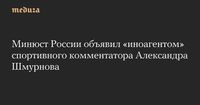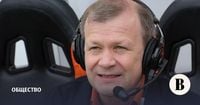On March 28, 2025, the Ministry of Justice of Russia updated its register of foreign agents, adding four individuals and one legal entity to the list. Among those included is sports commentator Alexander Shmurnov, who has garnered attention for his outspoken views against the Russian government and its military operations. The update has sparked discussions about the implications of such designations in the current political climate.
Shmurnov, alongside historian Irina Shcherbakova, rapper Artem Brovkov—known by his stage name Fuze—and politician Ksenia Cherepanova, now faces the label of a foreign agent. The Ministry asserts that these individuals have disseminated materials from foreign agents and have spread what it calls "unreliable information" regarding the actions of Russian authorities. This classification is not merely a title; it carries significant legal repercussions, including restrictions on financial support and participation in public life.
Shmurnov has a notable career as a sports commentator, previously working with NTV-Plus and Match TV, where he provided commentary on various football matches. However, following the onset of the military operation in Ukraine, he left Russia and currently resides in South America, where he runs a YouTube channel called "Shmurnov Time." This platform focuses on European and world football, allowing him to continue his commentary from abroad.
Historian Irina Shcherbakova, a co-founder of the Memorial Society, has also been recognized as a foreign agent. The Memorial Society, an organization dedicated to preserving the memory of victims of political repression in the Soviet Union, was liquidated by a Russian court in 2022. Shcherbakova's work has included leading educational programs and advocating for human rights. Her opposition to the military operation in Ukraine led her to emigrate from Russia with her husband, and she now lives in Weimar, Germany.
Rapper Artem Brovkov, performing as Fuze, is another figure on the list. He is known for his work with the hip-hop group Krec and has been vocal against the military operations, which prompted his departure from Russia in 2022. He continues to create music while living abroad, reflecting the sentiments of many artists who have chosen to leave due to the political climate.
Ksenia Cherepanova, the head of the Novgorod branch of the Yabloko party, remains in Russia and continues her political involvement. She has faced scrutiny for her criticisms of the government and is accused of spreading misinformation about the electoral system. Cherepanova has a background in economics and has held various positions in the government and educational sectors.
The inclusion of these individuals in the foreign agents register is part of a broader trend in Russia, where the government has intensified its crackdown on dissent and criticism. Since the law establishing the foreign agents register was enacted in 2012, the Ministry of Justice has included over 900 individuals and organizations, often citing their involvement in activities that oppose government narratives or support foreign influence.
In recent updates to the register, the Ministry of Justice has emphasized that individuals can be classified as foreign agents if they are deemed to be under "foreign influence," which includes receiving support from foreign sources or being affected by such influences through various means. This has raised concerns about freedom of expression and the rights of individuals to engage in political discourse without fear of retribution.
The implications of being labeled a foreign agent are profound. Those designated as such face restrictions on receiving state support, advertising opportunities, and participation in elections. In December 2024, President Vladimir Putin signed a law requiring foreign agents to open special accounts for their income, further complicating their financial independence and creative endeavors.
As the situation evolves, the actions of the Ministry of Justice and the responses from those affected will likely continue to attract attention both domestically and internationally. The designation of foreign agents has become a tool for the Russian government to silence dissenting voices and control the narrative surrounding its policies and actions.
In conclusion, the recent updates to the register of foreign agents highlight the ongoing tensions in Russia regarding freedom of expression and the treatment of dissent. With individuals like Shmurnov, Shcherbakova, Brovkov, and Cherepanova now facing the weight of this designation, the conversation around political repression and the rights of citizens remains critical in understanding the current landscape.








